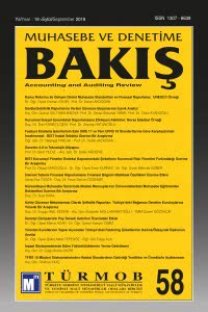Paydaşların çevre muhasebesi uygulamalarına etkileri
Stakeholders effects to environmental accounting applications
___
1. Akün L., “Çevre Muhasebesi: Genel Bir Bakıs”, Muhasebe Bilim Dünyası Dergisi, Cilt.1, Sayı.1, (1999),s.145-155.2. Bebbington J., Gray R., Thomson I. ve Walters D., “Accountants’ Attitudes and Environmentally-Sensitive Accounting”, Accounting and Business Research, Vol.24, No.94, (1994), s.109-120.
3. Deegan C. ve Gordon B., “A Study of the Environmental Disclosure Practices of Australian Corporations”, Accounting and Business Research, Vol.26, No.3, (1996), s.187-199.
4. Gray R. ve Bebbington J., Accounting for the Environment, Sega Publications, Londra, 2007.
5. Haftacı V. ve Soylu K, “Çevresel Bilgilerin Muhasebesi ve Raporlanması”, Kocaeli Üniversitesi Sosyal Bilimler Enstitüsü Dergisi, Sayı.15, No.1, (2008), s.92-113.
6. Hosmer D.W., Hosmer T., Cessie S.L. ve Lemeshow S., “A Comparison of Goodness-of-Fit Tests for the Logistic Regression Model”, Statistics in Medicine, Vol.16, (1997), s.965-980.
7. Kırlıoglu H. ve Kasapoglu Yıldız S., “Belediyelerde Çevre Muhasebesi Uygulaması”, Muhasebe ve Finansman Dergisi, Vol.22, Nisan, (2004), s.49-60.
8. Macve R., Accounting for Environmental Cost, The Industrial Green Game içinde (Editör: Richards D.), s.185-199, National Academy Press, Washington, 1997.
9. Mathews M.R., “Twenty-Five Years of Social and Environmental Accounting Research: Is There a Silver Jubillee to Celebrate”, Accounting, Auditing and Accountability Journal, Vol. 10, (1997), s.481-531.
10. Miles M. P. ve Munilla L. S., The Eco-Marketing Orientation: an Emerging Business Philosophy, Environmental Marketing: Strategies, Practice, Theory, and Research içinde (Editörler: M. J. Polonsky ve A. T. Mintu- Wimsatt), s.3-20, Haworth Press, New York, 1995.
11. Özbirecikli M., Çevre Muhasebesi: Kavramlar Uygulama Alanları Arastırma Sonuçları, Natürel Kitap ve Yayıncılık, Ankara, 2002.
12. Peattie K., Environmental Marketing Management Meeting the Green Challenge, Pitman Publishing, Londra, 1995.
13. Smith S.M. ve Haugtvedt C.P., Pro-Environmental Attitudes and Behavior: Implications of Understanding Basic Attitude Change Processes and Attitude Structure for Enhancing Behavior, New Developments in Environmental Marketing: Advances in Theory, Research, and Practice içinde (Editörler: Polonsky M. and Mintu A.), Hayworth Press, Ohio, 1995.
14.Welford R., Corporate Environmental Management 1 - Systems and Strategies, Earthscan Publications Ltd., Londra, 1998.
15.www.lakeheadu.ca, 2002.
- ISSN: 1307-6639
- Yayın Aralığı: 3
- Başlangıç: 2000
- Yayıncı: TÜRMOB
Paydaşların çevre muhasebesi uygulamalarına etkileri
"Kar maksimizasyonu" açısından transfer fiyatlandırması uygulamalarında ekonomik analiz ihtiyacı
“KÂR MAKSİMİZASYONU” AÇISINDAN TRANSFER FİYATLANDIRMASI UYGULAMALARINDA EKONOMİK ANALİZ İHTİYACI
Faaliyet tabanlı maliyetlemeye dayalı ekonomik katma değer analizi-enerji sektöründe bir uygulama
SERBEST MUHASEBECİ MALİ MÜŞAVİRLERİN GENEL SORUNLARI: ERZURUM İLİ ÖRNEĞİ
Kurumsal sürdürülenilirlik için muhasebe ve raporlama
SERPİL SENAL, BURCU ASLANTAŞ ATEŞ
Muhasebenin sosyal sorumluluk kavramı bağlamında ekonomik adam (Homo economicus) modeline bir bakış
